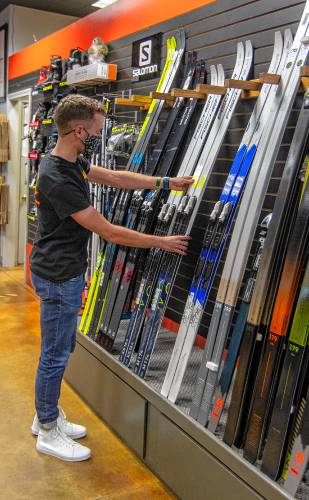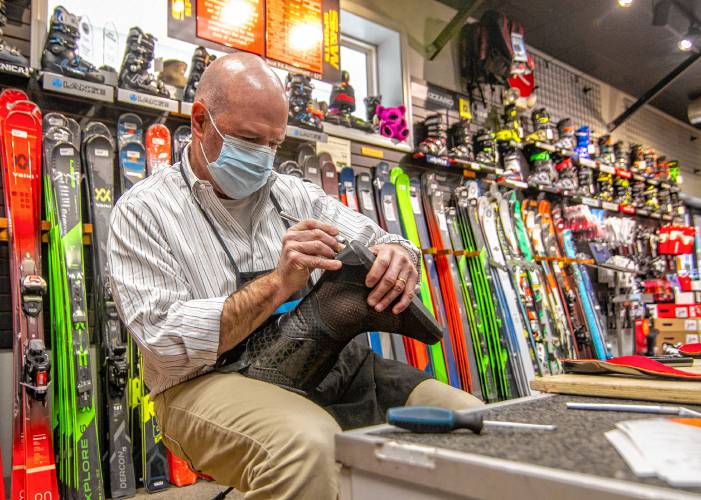
Story Produced by the Concord Monitor, a Member of

RELATED STORY ⇒ People flocking to XC skiing, snowshoeing during pandemic
You can add another activity to the list of those complicated by COVID-19: Climbing mountains in winter so you can ski back down.
“The segment that is hurting the most is A.T.,” said Tim Farmer, owner of venerable Concord ski store S&W Sports, using the abbreviation for “alpine touring” or backcountry skiing and snowboarding. The specialized bindings and skis for this activity are proving hard to find due to lower supply colliding with higher demand.
This once-obscure pastime was growing even before the pandemic, as reflected by the U.S. Forest Service’s 2018 decision to allow backcountry ski trails to be cut in the woods on Bartlett and Baldface mountains in the North Country. Now, however, it is besieged by people seeking outdoor fun that doesn’t require sharing chairlifts with strangers.
“Everybody wants to be outside, staying healthy. Talk about socially distancing yourself!” Farmer commented.

Adding to the backlog is an October fire at a massive factory in Ukraine owned by Fischer, Europe’s largest manufacturer of backcountry ski equipment. “They lost all the equipment that makes the skis – presses, all that stuff,” said Farmer. It won’t be up and running for a year, at least.
The result is similar to the bottleneck felt by the bicycling business in the spring, when being stuck indoors all day caused people to embrace two-wheeled recreation. Bicycle shops pretty much sold everything they had and that includes S&W Sports, for which bicycling is about 75 percent of the annual business.
The bike boom is continuing into winter, said Farmer, as reflected by “fat bikes,” which have extra-wide tires that can travel over snow.
“We’re having a stellar year with fat biking. As soon as it comes in, it’s gone. I have a feeling we’re going to run out of that stuff, too,” he said.
These activities are the latest that have been surging by the pandemic’s ability to instantly change consumer habits, starting with the overnight disappearance of toilet paper and flour from grocery shelves. Long manufacturing lead times for items such as ski equipment make it hard for industries to adjust quickly.
“So much is built in Asia, and a lot of them were shut down first” when the pandemic began. “Orders that I ordered to have shipped in September I’m just barely getting now, a good 60 days behind,” Farmer said.
The worsening pandemic is complicating future plans, as well.

“In normal years, in December I go to a show for next year’s clothing and place orders by January. In January, I go to a different show for hard equipment and place orders in March,” he said. But the areas used in Providence and Worcester, Mass., for these shows “have been turned into emergency hospitals” and who knows whether gatherings were even be allowed early next year.
“All the shows have been canceled. It’s going to be really interesting figuring out how to order next year’s stuff. … You can see it online but you can’t touch and feel stuff, you can’t sit with the reps,” Farmer said.
S&W Sports has been around for 40 years, including 13 years at its current location which with 10,000 square feet has room for storage and assembly as well as sales.
As for skiing, Farmer said he’s ready to empty house as needed. “We cleaned out every nook and cranny and storage container – have a lot of rentals and demos and stuff that we can sell off if the demand continues.”
And even if the pandemic leads to another retail shutdown there is plenty to do in preparation for 2021.
“Skiing is not essential but biking is. I can keep essential workers busy just assembling for next year. We need to build 300 bikes because we’re so far behind,” he said.
 These articles are being shared by partners in The Granite State News Collaborative. For more information visit collaborativenh.org.
These articles are being shared by partners in The Granite State News Collaborative. For more information visit collaborativenh.org.







